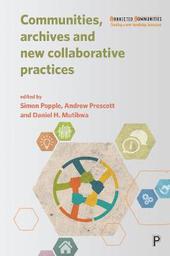
|
Communities, Archives and New Collaborative Practices
Paperback / softback
Main Details
| Title |
Communities, Archives and New Collaborative Practices
|
| Authors and Contributors |
Edited by Simon Popple
|
|
Edited by Andrew Prescott
|
|
Edited by Daniel Mutibwa
|
| Series | Connected Communities |
|---|
| Physical Properties |
| Format:Paperback / softback | | Pages:296 | | Dimensions(mm): Height 234,Width 156 |
|
| ISBN/Barcode |
9781447341949
|
| Classifications | Dewey:025.1714 |
|---|
| Audience | | Professional & Vocational | |
|---|
| Illustrations |
1 Tables, black and white; 22 Illustrations, black and white
|
|
Publishing Details |
| Publisher |
Bristol University Press
|
| Imprint |
Policy Press
|
| Publication Date |
26 February 2020 |
| Publication Country |
United Kingdom
|
Description
This innovative handbook examines the changing relationship between communities, citizens and the notion of the archive. Archives have traditionally been understood as repositories of knowledge and experience, remote from the ordinary people who fund and populate them, however digital resources have led to a growing plurality of archives and the practices associated with collecting and curating. This book uses a broad range of case studies which place communities at the heart of this exciting development, to illustrate how their experiences are central to our understanding of this new terrain which challenges traditional histories and the control of knowledge and power.
Author Biography
Simon Popple is Director of Impact and a Senior Lecturer in Photography and Digital Culture at the School of Media and Communication, University of Leeds. Andrew Prescott is Professor of Digital Humanities at the University of Glasgow. Daniel H. Mutibwa is Assistant Professor in Creative Industries and Digital Culture at the University of Nottingham, UK Campus.
Reviews"A testament to the vibrancy, depth, and diversity of collaborative research practices involving archives and archiving in the UK. It examines the challenges of collaboration, but even handedly celebrates the many benefits afforded by such modes of work." Richard Clay, Newcastle University
|